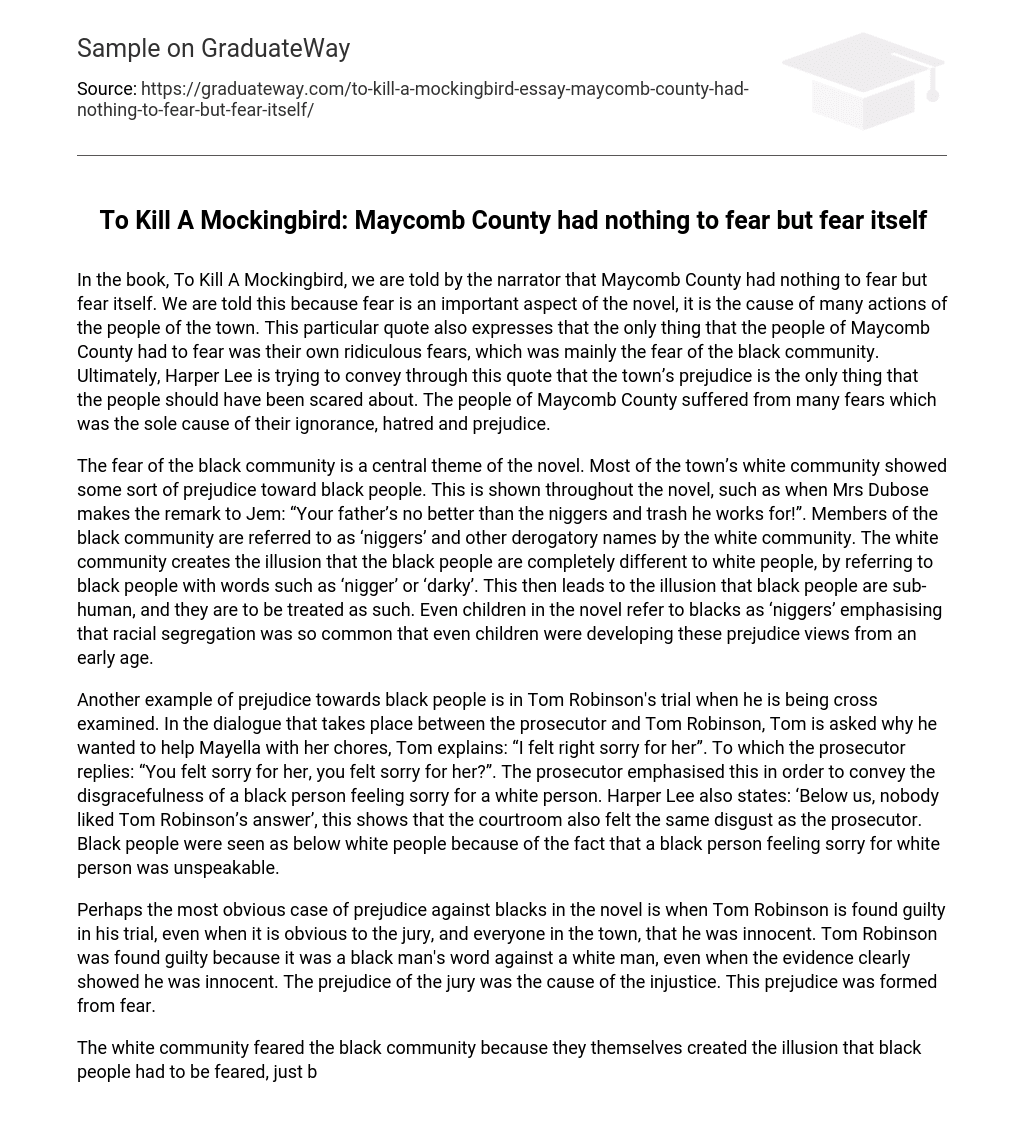In the book To Kill A Mockingbird, the narrator stresses that Maycomb County’s sole concern was fear itself. This highlights fear’s importance in the novel as it influences the actions of the townspeople. The quote specifically indicates that Maycomb County residents were troubled solely by their own irrational fears, particularly their fear of the black community. Harper Lee aims to underscore that prejudice in the town is the only genuine cause for worry. The residents of Maycomb County endured various fears, resulting ultimately in their ignorance, hatred, and prejudice.
The main theme of the novel is centered on the fear experienced by the black community. Throughout the book, it becomes clear that many white members of the town hold prejudice against black individuals. For instance, Mrs Dubose tells Jem, “Your father’s no better than the niggers and trash he works for!”. The white community consistently employs derogatory terms like ‘niggers’ and other offensive words to refer to black people. Through their use of language such as ‘nigger’ or ‘darky’, the white community perpetuates the misconception that black people are fundamentally different from white people. Consequently, this false belief justifies mistreatment and dehumanization of black individuals. Even young characters in the novel also employ ‘niggers’ to describe black people, underscoring how racial segregation has become deeply ingrained to such an extent that even children adopt these prejudiced viewpoints from an early age.
Tom Robinson’s trial demonstrates yet another instance of prejudice towards black individuals. During his cross-examination, the prosecutor questions Tom about his motivation for aiding Mayella with her chores. Tom responds by saying, “I felt right sorry for her.” The prosecutor’s repetition of Tom’s statement, “You felt sorry for her, you felt sorry for her?”, accentuates the inappropriate nature of a black person expressing sympathy for a white person. Harper Lee further illustrates the widespread disapproval of Tom’s response, stating, “Below us, nobody liked Tom Robinson’s answer.” This highlights that the courtroom shared the prosecutor’s disgust. The act of a black person feeling sorry for a white person was considered unthinkable, reinforcing the perception that black people were inferior to white people.
In the novel, a clear example of racial prejudice against black people is highlighted when Tom Robinson is convicted in his trial, despite overwhelming evidence and everyone in the town knowing of his innocence. This unjust ruling is rooted in the jury’s prejudice against a black man’s testimony over a white man’s, disregarding the evident proof. Fear is identified as the underlying factor that shapes this biased judgment.
The fear of the black community by the white community originated from their own creation of an illusion that black people should be feared simply because they were different. Instead of seeking to comprehend the slightly different characteristics of individuals with darker skin, the white community strengthened their fear by isolating themselves from the black community, thus widening the divide between them. This divide resulted in further misunderstanding, giving rise to ignorance, intolerance, and prejudice towards black people.
In addition to the black community, the residents of Maycomb County also held fear towards poor individuals, whom they derogatorily labeled as ‘trash’. This concept connects to the notion that these fears were born out of a lack of understanding regarding societal minorities. The novel illustrates prejudice against impoverished people through an incident involving Scout’s desire to play with Walter Cunningham. However, her aunt retorts, “He-is-trash, that’s why you can’t play with him!” Furthermore, she explains, “I’ll not have you around him, picking up his habits and learning Lord-knows-what.” This demonstrates Aunt Alexandra’s assumption that simply due to Walter Cunningham’s poverty, he would negatively influence Scout.
The fears of the people in Maycomb County stemmed from their fear of the unknown. The white community in town refused to acknowledge the humanity of black individuals, opting instead to segregate themselves based solely on skin color without making any effort to understand them. Consequently, they remained ignorant about the true essence of the black community. This lack of understanding prompted the white community to construct and spread beliefs that depicted black people as inferior beings, resulting in apprehension towards them. Likewise, Jem, Dill, and Scout each formed their own viewpoints regarding Boo Radley.
The children created fabricated tales about Boo Radley, as he was a mysterious and unfamiliar figure to them. In one such story, Jem described Boo as a towering individual with tracks indicating a height of about six-and-a-half feet. He claimed that Boo consumed raw squirrels and cats, which stained his hands with blood that could never be washed off. Jem also mentioned a visible scar across Boo’s face, while highlighting his yellow and decayed teeth, bulging eyes, and frequent drooling. Although the children were aware that this portrayal of Boo was untrue, they convinced themselves of its veracity because it provided a satisfactory answer to their question about Boo’s identity. They preferred believing a falsehood rather than facing the reality of their ignorance regarding Boo Radley. Similarly, the white community chose to accept the falsehood that black individuals were lesser beings rather than acknowledging their shared humanity with others. Atticus discussed this distorted belief in his speech, referring to the wrongful assumption that all black people were morally corrupt. He emphasized that this assumption was, in fact, an outright lie.
Fear is the source of the injustice in To Kill A Mockingbird, driving false beliefs and assumptions about others. Fear of the unknown and those who are different led to societal hierarchies, such as assuming that black people were immoral and poor people were white-trash. This novel highlights these fears and their destructive nature. Ultimately, the people in Maycomb County had nothing to fear except for their own irrational and harmful fears.
-Con





